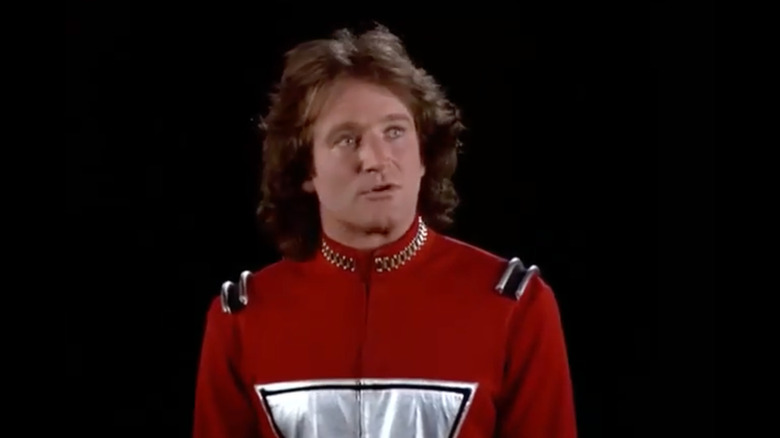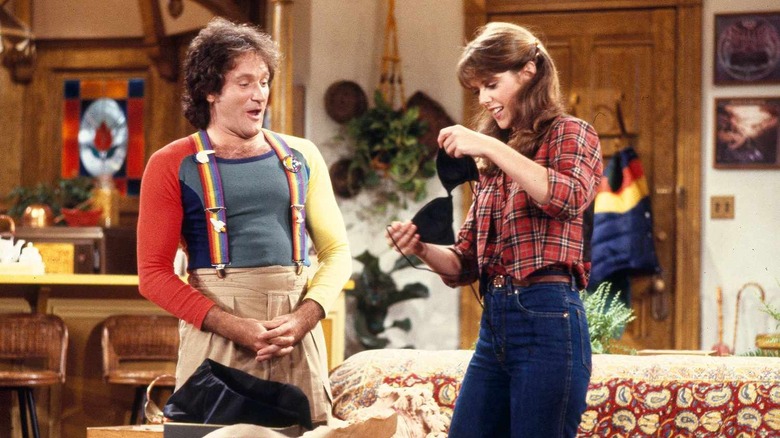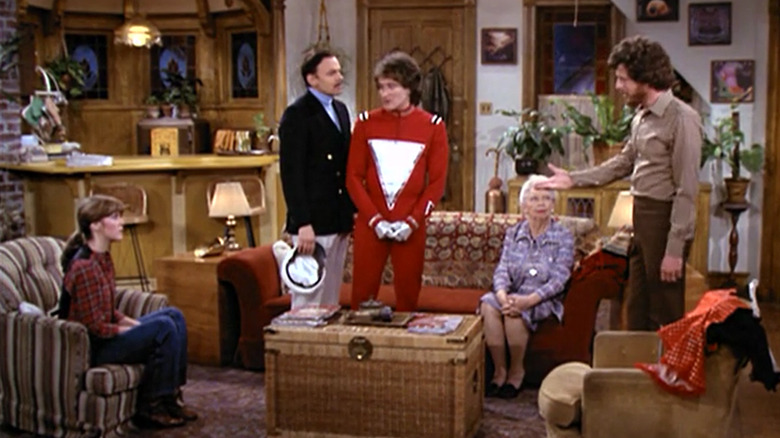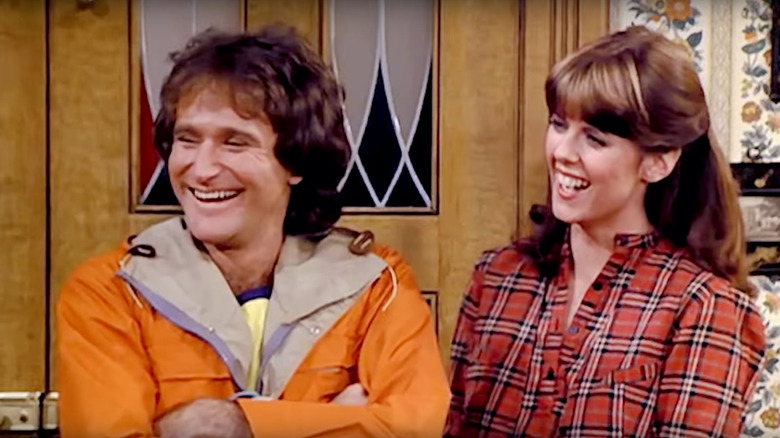Robin Williams' Time On Mork & Mindy Wasn't Without Controversy
Comedy theft is no joke but its legal recourse might as well be. Here's the thing: it's incredibly difficult to prove. Unlike more tangible art forms, oral comedy rarely leaves a traceable mark outside of memory. Granted, savvy comedians will see their craft documented by means of recording (and hopefully copyright), yet even that hardly certifies progeneration, rather only usage. Obviously, there's a lot more to it than this. The point we're trying to make is that legal ownership in the arena of comedy is murky at best and laughable at worst. Even the late Robin Williams found himself embroiled in accusations of comedy theft and not as the victim.
Allegations against Williams' originality have existed as long as his career and, as time continues marching mercilessly onward, possibly even a little longer. It would be easy to ignore the ordeal entirely on the merit of how many celebrities face similar claims, were it not for the sheer number of accusers and some suspiciously phrased comments from Williams himself. "Robin," a biography about Williams' life, written by David Itzkoff, dedicated a whole chapter to the situation, which erupted during William's time starring in the 1978 American TV series "Mork & Mindy," a show we can still hardly believe is a spinoff based on "Happy Days."
The Tribune's tribunal
As shared by David Itzkoff in "Robin," the accusations against Robin Williams started in 1979 when a Los Angeles magazine printed an anonymous article claiming that "Mork & Mindy" featured plagiarized content that Williams had allegedly stolen from L.A.-based stand-up comedians. It stated that the nameless comics would refuse to play if Williams appeared in the crowd. The kicker was that, apparently, one of the jaded jokesters physically assaulted Williams and demanded payment for their stolen intellectual property — payment that Williams allegedly agreed to provide. It was a brief tale, barely a paragraph, but it caught fire.
Other prominent papers ran with the story, including the New York Daily News and the Chicago Tribune, the latter of which elaborated in what Itzkoff describes as "unflattering" detail. The kindest impression the exposé offered was that Williams' newfound stardom required more creativity than one lone man could ever possibly provide, and that numerous celebrity personalities were notorious for their sticky fingers. As if that weren't enough, the Tribune went on to list every joke it believed that Williams had pilfered from his fellow comedians, jokes that were not only featured in "Mork & Mindy," but in Williams' stand-up routines, as well.
John Witherspoon, the comedian whom Williams allegedly stole the "what's happening, plasma?" goof from, told the Tribune that he'd confronted Williams in regards to the matter and that Williams had responded by saying, "well, I ad-lib a lot. If I used your line, I'll pay you." To this, Witherspoon rebutted with, "you can't pay me because 40 million people saw that show. If you gave me a dollar for every one of those people, that would be great. But otherwise, it's not even worth it."
A matter of opinion
Not that it matters in the legal sense, but every single comedian who could draw breath spared a few to remark upon the accusations levied against Robin Williams. As shared by David Itzkoff in "Robin," the entire community drew a line in the sand, which would have been almost touching if any two lines were drawn at the same spot, let alone on the same beach. For his part, Williams denied the allegations when confronted publicly, saying, "there's no truth in it. Those are all my friends and I don't want to bad-mouth any of them." Howard Storm, who directed "Mork & Mindy" echoed Williams' sentiment, adding, "when you're a success, it's the same old charge."
Comedians such as Jim Staahl believed that Williams' alleged antics fell within the permissible boundaries as defined by the industry, saying that, "Robin would see something and he'd appreciate it for what it was ... then he would incorporate it and do it his way ... we used to call it the 'sweet steal' ... there were times he could do a variation of somebody else's material and the audience wouldn't know."
Other comedians, like Richard Lewis, believed that William's alleged actions were detrimental to performers lower on the food chain, saying, "Robin could take a premise or a joke and then go off on it and make it better, because he was a genius. But a premise is gold. If a young comic has four, five minutes and he's going to go on The Tonight Show, and all of a sudden, Robin does three of his jokes, he's f***** ... there's real reason for some of these people to have tremendous hostility." Some, like Budd Friedman, even admired Williams for this supposed trait.
Innocently guilty
Possibly the most interesting take on the situation is that many believed Robin Williams incapable of stopping. As shared by Itzkoff in "Robin," Jim Staahl suggested that Williams simply couldn't help it, saying, "something would be in his head, and then it was like, pop, his synapses would go so fast ... and later he would go, 'oh, crap, that was so-and-so's line. I swear to God, it was innocent.'" Joshua Raoul Brody, the composer on board for "Mork & Mindy," recalled a memorable afternoon where Williams parroted a story back to the teller only moments after it was initially shared, saying that, "in the course of a cab ride, he had forgotten where he had heard the story ... I offer guilty with an explanation, your honor. It was a disease, it wasn't theft."
Later comments, in which Williams referred to himself as a "bank of comedy" which made hasty deposits and withdrawals, seem to corroborate this notion that he literally could not turn it off. Williams also noted that there was a time in his life when he would avoid comedy clubs altogether to prevent further accusations. For good or for ill, however, that bell was already rung.



